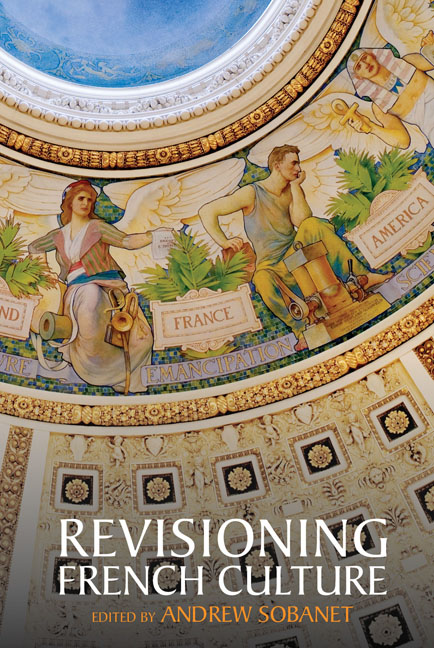Book contents
- Frontmatter
- Contents
- Introduction
- I France in Perspective: The Hexagon, Francophonie, Europe
- II Visions of the World Wars, or L’Histoire avec sa grande hache
- III Refractions and Reflections
- IV French Literature, Revisioned
- V The Subject in Focus
- VI Philosophical Lenses
- VII Coda
- Contributors
- Acknowledgments
- Index
23 - Jacques Derrida's Pedagogical Imperative for the Sciences
- Frontmatter
- Contents
- Introduction
- I France in Perspective: The Hexagon, Francophonie, Europe
- II Visions of the World Wars, or L’Histoire avec sa grande hache
- III Refractions and Reflections
- IV French Literature, Revisioned
- V The Subject in Focus
- VI Philosophical Lenses
- VII Coda
- Contributors
- Acknowledgments
- Index
Summary
Anyone who knows Lawrence D. Kritzman can be excused for thinking that he is French studies. His publications have touched on its every subfield (whether by genre or date) and display a depth and breadth beyond the reach even of specialists. His carnet d’adresses is the envy of the field, and he has used it to bring people together and foster the exchange of ideas. Indeed, bringing people together is perhaps his true specialty, as can be seen biennially at the summer programs of the Institute of French Cultural Studies. These programs bring graduate students and early-career faculty together with leading scholars and intellectuals to probe a cultural theme and translate research into undergraduate curricula. As director, Kritzman insists that everyone be treated equally, sur un pied d’égalité; students and faculty alike become the Institute's ‘participants’ and thereby a community. Like his publications, Kritzman's service to the field is testimony to how, throughout his career, he has answered his vocation as a teacher: he has unyieldingly professed a love for the French language, its cultures and texts, and, most importantly, his students—who, in gratitude, have returned this love with public recognition and private thanks. Kritzman's enthusiasm for the field is infectious, and many of his students have continued on in French, whether as academics, writers, artists, or, at the very least, amateurs de bonne cuisine. And yet, to claim French studies, c’est lui! would betray Kritzman's own pedagogy, which is hostile to hierarchy yet hospitable to alterity.
In his seminal apologia for French studies, ‘A Certain Idea of French: Cultural Studies, Literature and Theory,’ Kritzman noted that the introduction of cultural and Francophone studies into traditional departments of French had often led to ‘an uncritically reductive gesture [that] saw these new developments as a threat.’ Instead, Kritzman argues that our pedagogical imperative ‘should enable us to be hospitable to alterity,’ whether in the form of Daddy Yod or Voltaire. While the main thrust of his argument concerns alterities within French studies, Kritzman presciently spoke to one of today's concerns as well, namely our apprehension of and resulting inhospitality toward that other university Other, the sciences:
In studying texts and other cultural objects we must transcend the divisionality of literature […] we should not forget […] that science and literature once functioned in a dialogic relationship that allowed for epistemic transfers […]
- Type
- Chapter
- Information
- Revisioning French Culture , pp. 330 - 344Publisher: Liverpool University PressPrint publication year: 2019

